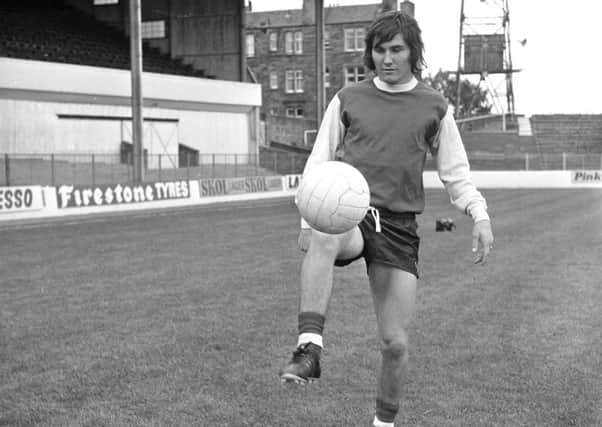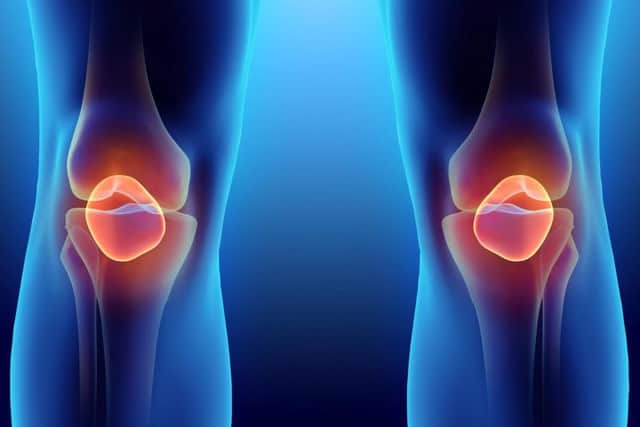Retired professional footballers at higher risk of knee osteoarthritis


The research was led by academics at The University of Nottingham and funded by the charity Arthritis Research UK with collaborative support from FMARC (FIFA's Medical and Research Centre), the Professional Footballers Association (PFA) and SPIRE Healthcare Group.
The study reported that male ex-footballers were two to three times more likely to suffer from knee pain and knee osteoarthritis and require a total knee replacement, even after adjustment for other risk factors including significant knee injury. Ex-footballers reported more knee pain, structural knee osteoarthritis on x-ray and total knee replacements across all age groups in the study and especially in younger age groups (40-54 years).
Advertisement
Hide AdAdvertisement
Hide AdPublished in the British Journal of Sports Medicine, the research also revealed that although former footballers presented with more musculoskeletal pain, they were less likely to suffer with and report other conditions or diseases such as diabetes, heart attacks and cancer.


The study was led by Dr Gwen Fernandes and Professor Michael Doherty who are part of the Arthritis Research UK Centre for Sport, Exercise and Osteoarthritis and are based in the department of Academic Rheumatology in the University's School of Medicine.
Professor Mark Batt, Director of the Arthritis Research UK Centre for Sport, Exercise and Osteoarthritis, and part of the research team, said: "This was a well-conducted study powered to investigate both the positive and negative effects of playing professional football. The research will allow us to more accurately communicate both the associated benefits and risks to those involved in the industry."
This is the largest and most comprehensive study conducted in the UK and internationally on establishing how common knee pain, osteoarthritis and knee replacements are among ex-professional footballers when compared with the general population and to look specifically at whether this was influenced by other factors such as previous knee injury.
More than 1,200 ex-footballers with an average age of 59 years were recruited via the PFA and from individual league clubs and professional football associations in the UK and compared to more than 4,000 general population men from the East Midlands region with an average age of 62.8 years.


Other novel findings include: ex-footballers had more osteoarthritis in the end joints of their fingers (nodal OA), were more likely to have an index finger shorter than their ring finger -- also known as a pattern three-digit ratio, which has been previously linked to osteoarthritis risk; and reported significantly more body pain, knee misalignment and use of painkillers.
The research suggested that there could be modifiable risk factors such as obesity management and not engaging in other high-risk occupations post-retirement from professional football. Reducing the number of significant knee injuries in professional football would also have an important impact on the development of knee pain, knee osteoarthritis and the requirement for a knee replacement.
The study concludes that the 'repetitive microtrauma' of professional football, regardless of significant injury, is likely to be the main cause of increased risk of knee osteoarthritis. The reported degree of increased adjusted risk (at least doubled) is in the order required by many national bodies to recognise knee osteoarthritis as an industrial disease for professional football.
Advertisement
Hide AdAdvertisement
Hide AdDr Stephen Simpson, Director of Research & Programmes at Arthritis Research UK, said: "Osteoarthritis is the most common cause of joint pain and affects over 8 million people in the UK."
"Studies that focus on elite athletes, such as professional footballers, are useful in understanding the long-term impact of specific movements on musculoskeletal health, especially those associated with sports. Ultimately, this can help pinpoint links and risk factors for osteoarthritis leading to effective ways to treat it and to prevent its development.
"It's worth reminding people who take part in regular sports or physical activity, such as football, that regular exercise is important for all ages and the long-term health benefits are immense.
"If you are injured, we would advise that you take care and consult a health professional as soon as possible, to get advice to enable the best recovery."
The Football Association, Professional Footballers' Association, Premier League and EFL, said: "We welcome Arthritis Research UK's study into cases of ex-professional footballers affected by osteoarthritis and have collectively and collaboratively supported them in this research. Although there are multiple health benefits from playing football, we are also aware of the risks of intensive and prolonged training and playing at professional level.
"We understand that there are far-reaching and wider benefits of playing football, including overall quality of life and physical and mental well-being. However, it is important that we continue to support ex-professional players with the condition and use this new research to form practical guidance for current professional footballers and clubs to help minimise the risk of developing osteoarthritis."
‘Replacing knees is best thing I’ve done’
Former Hibs and Celtic star Jackie McNamara Snr told of his experience with knee osteoarthritis that led to him having both knees replaced.
He said: “My experience was I ruptured my cruciate before I knew what a cruciate was when I was with Celtic and they pumped me with cortisone and you think you’re being looked after.
Advertisement
Hide AdAdvertisement
Hide Ad“I think there was one substitute when I played and I ended up on the wing for 60 minutes with a serious injury.
“I did it in 1974/75 season and ended up having eight or nine cortisone injections at Celtic and I know that Allan McGraw who played for Morton had a lot more than that when he was a young man. I’ve now had both knees replaced and it’s the best thing I’ve done.
“I had my first operation aged 62 and the second one when I was 64. I was in total pain like chronic toothache.
“Anyone who has had the pain will know the duvet cover on your bed is too heavy to lay on your legs, it’s as bad as that.
“But Tom McNiven the wonderful physio I had at Easter Road told me to hold off as long as I could because of the longevity of a replacement at the time. So I waited until my 60s and I’ll get 20 years out of the new knees.
“I’m able to do things that I wasn’t able to before.
McNamara welcomed the advances in technology and the type of study funded by Arthritis Research UK.
He added: “I think it’s great that technology has come that far that they can replace knees.
“I was fortunate that I moved to Hibs and they had a great surgeon and a fabulous physiotherapist that kept me in the game otherwise I was on the scrap heap with Celtic at 23-years-old.
“But luckily Eddie Turnbull the Hibs Manager wanted me even though I failed the medical for Hibs.”